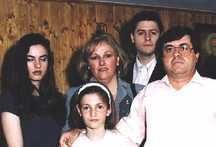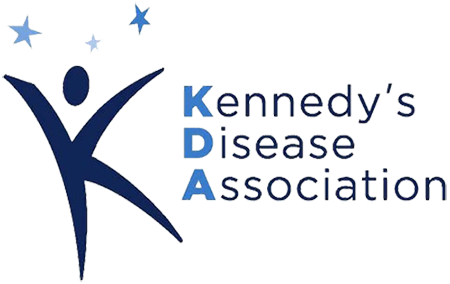Fernando Gines Ortega, Born 1948 - Spain

Before I start to tell my personal history as a patient of Spinal Bulbar Muscular Atrophy, I want to give some personal data:
I was born April, 24, 1948, and I am the seventh son of a family of seven children (six men and one woman). I am the youngest and, fortunately, I think I am the only heir of this illness in my family. None of my brothers, all of them older than me, have any symptoms that would lead us to suspect to Kennedy's Disease. I can doubt only one of my brothers, who died at age of 34 due to a heart attack, so we don’t know if he could have had the illness.
We do not know about more members of my family who might have had Kennedy's Disease, although in the old days there weren’t proper methods to diagnose this kind of illness.
I am married to Cristina (45 years old) since 1974 and we have three children: Fernando, Susana and Ana Cristina who are 25, 23 and 11 years old respectively. We live in a village 13 kilometers from Madrid called Rivas-Vaciamadrid.
I had normal health during my childhood and also when I was young. I did my military service in the Spanish Navy, and, of course I had to do all the physical exercises like the rest of my partners, without realizing any difference in physical strength as a normal person. I was serving on a ship which was destined to take out mines from the sea for two years, and after that, as a civil person, I worked as a Radiotelegraphic Officer on different commercial ships for another three years, traveling around lots of countries of the world, mainly Europe, Africa, North and Middle America. Later I worked on an informatics multinational enterprise for thirteen years and afterward I had my own enterprise for another twelve years, until 1998, when I had to retire due to my illness.
The first symptoms of the illness came when I was 30, and they consisted of lots of muscular cramps, mainly in my abdominal muscles and legs. These cramps were very painful, but, naturally, I didn’t associate them with any illness, I thought it was something personal I had to learn to live with.
When I was 40, in 1988, as I walked on the beach with my wife, she noticed something strange in my way of walking, I left strange print foots due to the way I walked with the weight shifted to my heels. This happened because, as I started to have some disability of my feet, I leaned on the heels too much. Afterward, at home, I noticed that if I tried to stay on tiptoe, after 15 or 20 seconds, my heels went to the floor; although I didn’t want them to. This started to look like very strange to me, at the same time I started to have problems going up stairs or carrying some heavy loads like suitcases or small furniture.
As my muscular weakness grew, the strong cramps disappeared. Finally, in 1992, I went into Hospital and they ran some tests on me in order to determine the cause of weakness. After different blood tests, brain liquid extracting, muscle and nerve biopsies, mediastino TAC and some others, I got the result: SBMA, but yet I am waiting for the DNA blood test that seems to be the one to confirm the illness. I think I will have the definitive result in May 2001.
From 1992 on, my weakness has been growing mainly in my arms and legs, although it isn’t symmetric, I mean, my left hand and foot are stronger than the right ones, and the ability to move fingers is better on my right hand than in the left one.
I don’t realize special difficulty to swallow and talk, although my voice has become more nasal and less strong. Also I have had, as it is told at all personal histories I have read, shortness of breath episodes and breathing difficulties when a piece of meal or even liquids go the wrong way in my glottis. This is really our major problem, because we scare ourselves and the people who are with us; it is a very anguishing situation and you can’t help panic to be your owner. It’s been a long time since I had the last episode because most of them come at night when I am in bed and from time-to-time the meal which is in your stomach comes up; I have learned that, in order to avoid this, I must not eat within three to four hours before I go to bed. Since I began to apply this rule I haven’t had any more episodes. Anyway, if this happens I have developed a technique that is consists of holding my breath for as long as I can in order to give enough time to the muscle which closes the tracheal valve to relax.
In 1998, the weakness was important enough to gave up the enterprise and retire definitively at home. I had to take this decision due to the frequent falls, which caused me to break my shinbone and fibula. I had to have medical surgery on my left leg. Also in September 2000, I broke my right fibula and I am still recovering from it.
Nowadays, I can walk through the house without problems, but carefully. I am able to walk outside on flat surfaces for about 20 to 25 minutes if I hold on to my wife's arm. After this time I have to use the wheelchair. Yet I am able to drive automatic vehicles and it is then when I feel like a normal person; this stands out in my mind. I find it quite difficult to lift up my arms over my head, so things like combing or washing my hair needs collaboration. Thanks to God, I have a fantastic wife who cares very well for me and helps me with all the things I am not able to do myself.
My life runs now between the personal computer, reading and TV, and from time-to-time I can practice my favorite hobby, which is flying airplane models controlled by radio. I need of course someone who helps me with the engine start and loading of things. I will keep practicing while I keep enough strength on my fingers to move the control sticks.
I want to thank Terry and Susanne Waite and Patrick Griffin for having developed the Kennedy's Disease Association, because, thanks to it, I have been able to meet some people affected by Kennedy's Disease; with some of them I keep frequent communication and I hope that soon I will meet somebody from my country with whom I can exchange experience and information about our illness.

